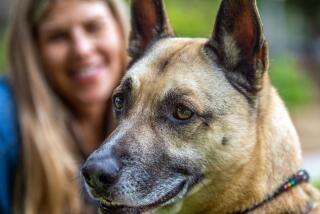‘If you don’t change, the dog’s problem won’t change.’
- Share via
When animal behaviorist Dennis Fetko walks through the door of his Poway home, he is instantly surrounded by flying fur and wagging tails. Fetko, known as “Dr. Dog , “ says all four of the pets frolicking happily around his feet are “rescues,” dogs that were so vicious or anti-social that they were destined to be put to sleep--until he turned their lives around. Times staff writer Leslie Wolf interviewed Fetko, and Dave Gatley photographed him.
I started working with dogs in 1960. I took my own dog through an obedience program and enjoyed it, so the instructor asked if I’d be interested in assisting him. I really never found a full-time job I enjoyed as much.
What got me into behavior was a very serious back injury in the late ‘60s. I was a martial-arts instructor at the time, and there was an accident during preparation for a tournament, and I broke some vertebrae. They said it would be questionable if I walked again, let alone work with dogs.
So I started asking some very simple questions. Obviously, dogs have been training other dogs for hundreds of thousands of years, and you never see a dam (mother) with a litter jerk a puppy’s collar, or scream directions or hit a pup. If dogs don’t have to do that to dogs to train them, why do we?
What we used to do 30 years ago was very punitive. We really didn’t know very much about dogs then. I obtained a Ph.D. in behavioral psychology at La Jolla University, a private tutorial school. The first very serious animal behavior research was being conducted about that time.
I started making radio and television appearances, and at first I used my real name, Dr. Fetko. But my last name was a problem because someone listening on the radio might think I was representing Petco or Fedco. One night in 1981, a fellow called in to a talk show I was doing on KSDO and asked, “Is this Dr. Dog?” Everyone started calling me that, and it stuck.
I do training with animal control departments, humane societies and animal welfare and protection associations throughout the country. I’ve been a training instructor for the San Diego County Department of Animal Control for 10 years. But the bulk of my work is with individual clients.
When I arrive at the house, I need to get a very detailed history and a diet review from the owners. Then I do a temperament evaluation with the dog itself. Each dog has a different temperament and personality. You have to get to know them individually.
Usually it only takes one visit to get a handle on whatever behavioral problems that dog has, whereas it might take months of obedience training. You see, most people who enroll in obedience don’t really want obedience, they want a problem solved.
Obedience training is probably the single most constructive thing people can do with their dogs, but it’s not designed to solve problems. You may have a dog that bites, barks and chews, and you can teach it to come, sit and heel, but the dog will still bite, bark and chew. Obedience means command response. Behavior means what they are like without commands. You don’t want a dog who will respond to a command to stop attacking your small child--you want a dog that will not attack the child in the first place, right?
Stress is the simplistic answer for why dogs do things wrong. For example, the dog is a chronic chewer, and the evaluation shows it’s noise shy--and it lives in Point Loma, under the flight path. It’s a very situation-specific thing. Other dogs are very, very sensitive to isolation. In the typical yuppie, two-income households today, the dog gets maybe an hour of attention a day. For a pack animal, that’s not enough.
Praise and punishment are subjective concepts--they mean different things to different people and different dogs. I need to find out what the dog likes in order to reward it. Punishment must never cause pain or terror, ever. Not because they’re easily hurt--slapping a dog is like slapping a Buick--but it’s traumatic to them. So my job is to come up with a punishment that acts as prevention, an effective way to punish without triggering defense reflexes or making the dog hate the owner.
The owners are, hands down, the single biggest influence on that critter; that’s why I have to go to the home. If you don’t change, the dog’s problem won’t change. Sometimes we never get to the root of the dog’s problem. If you get a dog from a pet shop, you don’t know what it’s been through. Trauma is very indelible when induced early. So we always try to treat the genesis of it, but sometimes it’s just a moot point.
More to Read
Sign up for Essential California
The most important California stories and recommendations in your inbox every morning.
You may occasionally receive promotional content from the Los Angeles Times.













